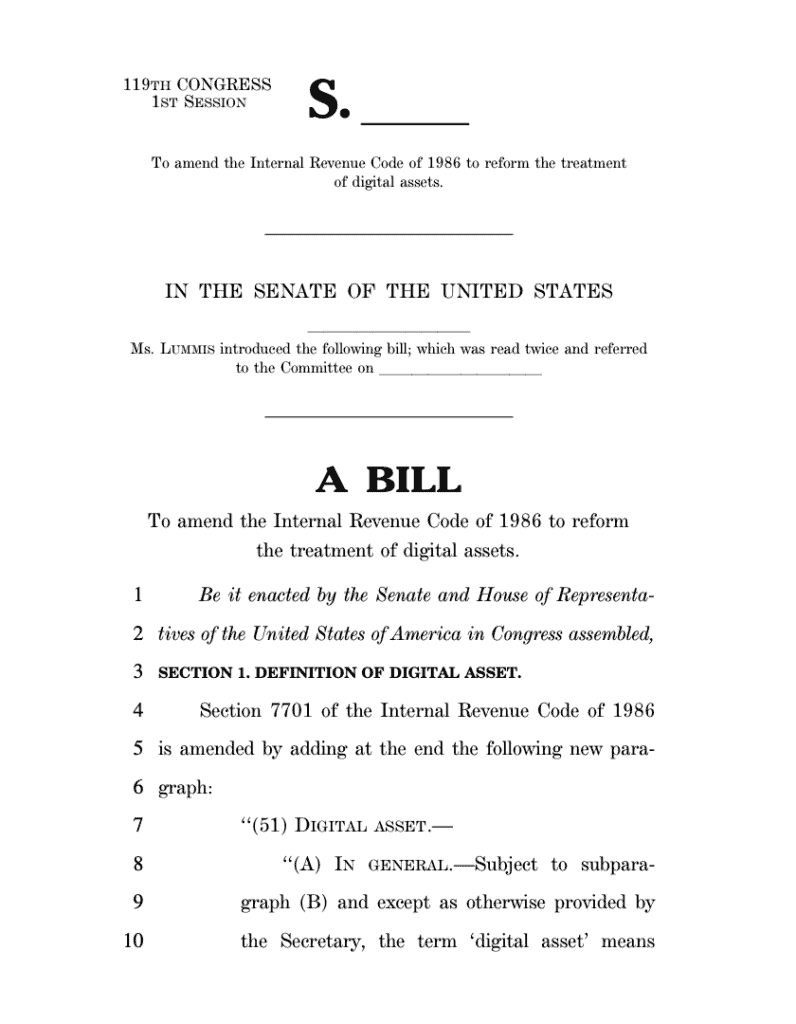What’s in the bill?
| Pain point | Lummis fix |
| Every cappuccino is a taxable nightmare | Creates a de minimis exclusion: gains on transactions ≤ $300 are ignored, up to $5 000 total per year, indexed for inflation from 2026. |
| Block-reward “phantom income” | Taxes on mining & staking rewards are deferred until the coins are sold, ending the “tax now, cash later” problem that forced some miners to dump holdings in bear markets. |
| Lending is not a sale | Extends the long-standing securities-lending safe harbor (IRC § 1058) to digital assets, so parking your SOL on Aave won’t trigger capital gains. |
| Wash-sale loophole | Applies the 30-day wash-sale rule to crypto, killing the “sell-ETH-for-a-tax-loss-and-buy-it-back-ten-seconds-later” strategy. |
| Dealer parity | Lets full-time traders elect mark-to-market accounting, just like equities desks. |
| Charitable giving red tape | Treats liquid tokens like publicly traded stock, waiving pricey appraisals for donations. |
The Joint Committee on Taxation pegs the package at positive $600 million over ten years — proof, Lummis boasts, that “common-sense reform doesn’t have to blow a hole in the deficit.”

Page 1 of the Bill, Source: Lummis
Why it matters
For U.S. users, every sat spent on groceries currently demands a capital-gain calculation. That’s insane for a network that can split a Bitcoin into 100 million units. The bill’s $300 buffer borrows from the existing foreign-currency exemption, acknowledging that nobody tracks penny-level FX gains when they swipe a Visa in Paris.
On the mining side, the change lines up with Jarrett v. United States, the high-profile Sixth Circuit case arguing that newly minted tokens shouldn’t be taxed until sold — a position championed by Coin Center since 2021.
How we got here
Lummis tried to slip similar language into Trump’s must-pass budget juggernaut last week. In a marathon vote-a-rama, the crypto pieces were jettisoned, leaving lobbyists fuming and the senator promising a “Plan B.” Today’s filing is that Plan B.
Early reaction
- Industry groups are ecstatic. The Blockchain Association calls the de minimis rule “a prerequisite for crypto to function as electronic cash.”
- Tax nerds give cautious thumbs-up. KPMG’s crypto-lead points out that wash-sale parity removes an “unfair advantage” critics of the asset class love to highlight.
- Hardline deficit hawks scoff at the $600 million pay-for, calling it “decimal-dust” in a $7 trillion budget.
Road ahead
The bill heads to the Senate Finance Committee, where Chair Ron Wyden (D-Ore.) has hinted at holding a hearing on “modernizing digital-asset taxation” before the August recess. Meanwhile, the House is hashing out the Digital Asset Market Clarity Act — meaning conference-room brinkmanship is inevitable if either chamber moves first.
Lummis wants public comment: her office posted the draft PDF and invited suggestions on X.
The contrarian take
Cutting red tape is great, but let’s not pretend a $300 threshold turns Bitcoin into Apple Pay overnight. The real friction isn’t the tax line item — it’s clunky UX, slow settlement, and merchants who’d rather not gamble on price swings. And by extending wash-sale rules, Congress is about to discover whether the IRS can even track wallet hopping across thousands of DEXs. Spoiler: it can’t.
Still, deferring block-reward income is a rare alignment of tax logic and technological reality. If Washington doesn’t seize this low-hanging fruit, miners will keep relocating to friendlier jurisdictions — and the IRS will continue chasing phantom gains it never collects.
In other words, the Senate finally has a bill that marries revenue, rationale, and innovation. Now it just has to get it through… the Senate.
 bravenewcoin.com
bravenewcoin.com